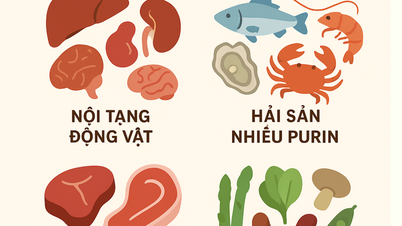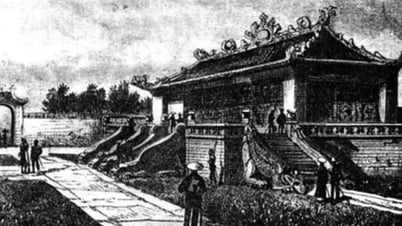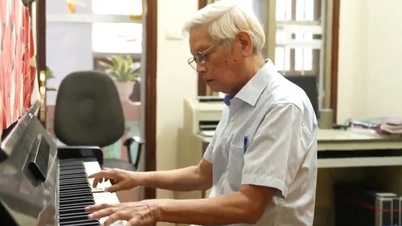Therefore, nutrition is receiving more attention from doctors in the treatment process for patients.
Patient exhausted due to small bowel necrosis
Since birth, Mr. PHM (residing in Xuan Hoa commune, Dong Nai province) has had an intestinal malformation, poor absorption of food leading to severe malnutrition. His weak body makes him unable to do anything.
Ms. NTM, Mr. M's mother, said: The family took Mr. M. to several hospitals for examination and the doctors told them that one in every thousand people has the same disease as Mr. M. and has to live with it.
lifelong.
In mid-July 2025, Mr. M. was taken to Dong Nai General Hospital by his family for emergency treatment in a state of fatigue, unable to eat or drink, losing weight rapidly, and having pale skin. Not long before, Mr. M. had undergone two intestinal torsion surgeries at Cho Ray Hospital ( Ho Chi Minh City). When admitted to Dong Nai General Hospital for emergency treatment, the patient weighed only 28kg and was severely weakened.
Doctor Le Ngoc Thanh Vinh advises patients on nutrition after discharge from the hospital. Photo: Hanh Dung |
Specialist Doctor I Le Ngoc Thanh Vinh, Department of General Surgery, Dong Nai General Hospital, directly examined the patient. According to Doctor Vinh, the key issue is to improve the patient's nutritional status before surgery. Because a "hungry" patient cannot perform surgery well, only when "full", that is, having enough energy and nutrients, can they recover quickly and reduce complications.
Dr. Vinh applied the ERAS protocol (early recovery after surgery), focusing on nutritional care to improve the patient's general condition. After 8 days of proper nutritional care, the patient's general condition improved significantly, meeting the conditions for intestinal closure surgery.
However, the surgery encountered many difficulties because the patient's intestinal loop was abnormally dilated to 8-10cm (normal is 2-3cm), with a high risk of leaking the anastomosis. The doctors meticulously removed adhesions and reconnected the intestine to minimize the risk of leakage after surgery.
Thanks to close post-operative monitoring and adjustment to a soft, liquid diet rich in soluble fiber and easily digestible protein, after only 13 days post-operatively, the patient recovered well, was able to walk on his own, gained 5kg and was discharged from the hospital.
Dr. Le Ngoc Thanh Vinh emphasized: “Therapeutic nutrition is an indispensable part of comprehensive treatment measures for patients. Therefore, depending on each different patient, there will be different nutritional regimens to effectively treat the disease.”
Harmonious combination of nutrition and treatment
Dr. Le Ngoc Thanh Vinh said: Previously, some cases had illnesses similar to patient M. but had a long hospital stay of up to 2 months due to lack of attention to nutritional intervention. In the case of patient M., it only took about 3 weeks of treatment to recover well, showing that clinical nutrition is a vital factor in the treatment of serious illnesses. Good nutrition not only helps patients have enough strength to overcome surgery, but also promotes rapid wound healing, reduces the risk of complications, shortens hospital stay, reduces costs and burdens on the family.
Highlighting the role of nutrition in the treatment of internal and surgical diseases, MSc. Doan Quyet Thang, Deputy Head of the Department of Nutrition, Thong Nhat General Hospital, said: Nutrition is not only a meal, but also a treatment. Only when nutrition is harmoniously combined with modern medical techniques, can patients have the opportunity to recover quickly and comprehensively.
For example, patients with serious illnesses such as pneumonia, heart failure, kidney failure, cancer, severe trauma or post-surgery often consume a lot of energy, have nutritional imbalances and are at risk of exhaustion. If not supplemented with nutrients in time, the patient's body will have reduced resistance, prolong the time in hospital, and even increase the risk of death.
Nutritionists say: For patients with serious internal diseases, providing enough energy and nutrients helps maintain organ function and improve immunity. In surgery, especially after surgery, proper nutrition helps wounds heal quickly and reduces infection.
Currently, in some hospitals in the province, clinical nutrition has become a supporting treatment specialty, closely coordinating with internal medicine, surgery, anesthesia and resuscitation doctors and emergency resuscitation doctors. Thanks to this coordination, many seriously ill patients have the opportunity to recover faster.
According to Dr. Thang, not only with serious, acute diseases, but also with chronic diseases, a reasonable nutritional regimen is needed for each patient. For example, diabetic patients need to pay attention to using foods low in sugar, eating lots of green vegetables, paying attention to the amount of protein and fat, ensuring enough energy for the body. As for patients with high blood pressure, it is necessary to limit the amount of salt taken into the body. For patients with kidney failure, depending on the different stages of the disease, the energy taken into the body also needs to be adjusted.
different…
Hanh Dung
Source: https://baodongnai.com.vn/xa-hoi/y-te/202508/vai-tro-cua-dinh-duong-trong-dieu-tri-cac-benh-ly-noi-ngoai-khoa-nang-b082887/




![[Photo] Celebration of the 65th Anniversary of the Establishment of Diplomatic Relations between Vietnam and Cuba](https://vphoto.vietnam.vn/thumb/1200x675/vietnam/resource/IMAGE/2025/9/1/0ed159f3f19344e497ab652956b15cca)
![[Photo] Chu Dau Ceramics – Proud of Vietnamese identity at Exhibition A80](https://vphoto.vietnam.vn/thumb/1200x675/vietnam/resource/IMAGE/2025/9/1/c62ab2fc69664657b3f03bea2c59c90e)
![[Photo] People eagerly wait all night for the parade on the morning of September 2](https://vphoto.vietnam.vn/thumb/1200x675/vietnam/resource/IMAGE/2025/9/1/0cf8423e8a4e454094f0bace35c9a392)
![[Photo] Solemn reception to celebrate the 80th anniversary of the National Day of the Socialist Republic of Vietnam](https://vphoto.vietnam.vn/thumb/1200x675/vietnam/resource/IMAGE/2025/9/1/e86d78396477453cbfab255db1e2bdb1)
![[Photo] General Secretary receives heads of political party delegations from countries attending the 80th anniversary of our country's National Day](https://vphoto.vietnam.vn/thumb/1200x675/vietnam/resource/IMAGE/2025/9/1/ad0cb56026294afcae85480562c2e790)
![[Photo] National Assembly Chairman Tran Thanh Man receives Cambodian Senate President Hun Sen](https://vphoto.vietnam.vn/thumb/1200x675/vietnam/resource/IMAGE/2025/9/1/7a90c9b1c1484321bbb0fadceef6559b)






















![[Infographic] A week of strong fluctuations, gold prices continuously set historical peaks](https://vphoto.vietnam.vn/thumb/402x226/vietnam/resource/IMAGE/2025/9/1/1520fa24c9c94c39afee9a58ceb09de1)






































































Comment (0)